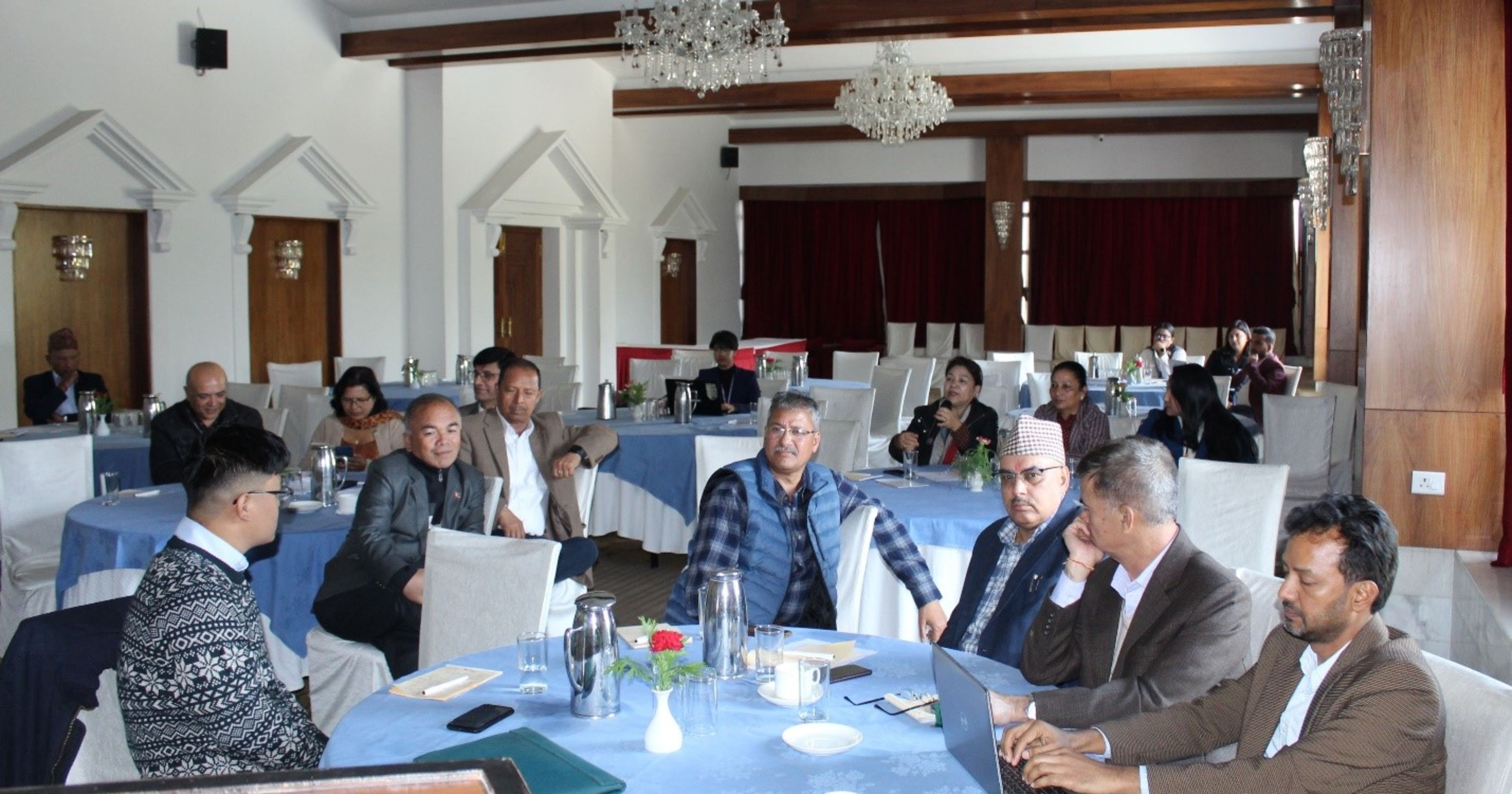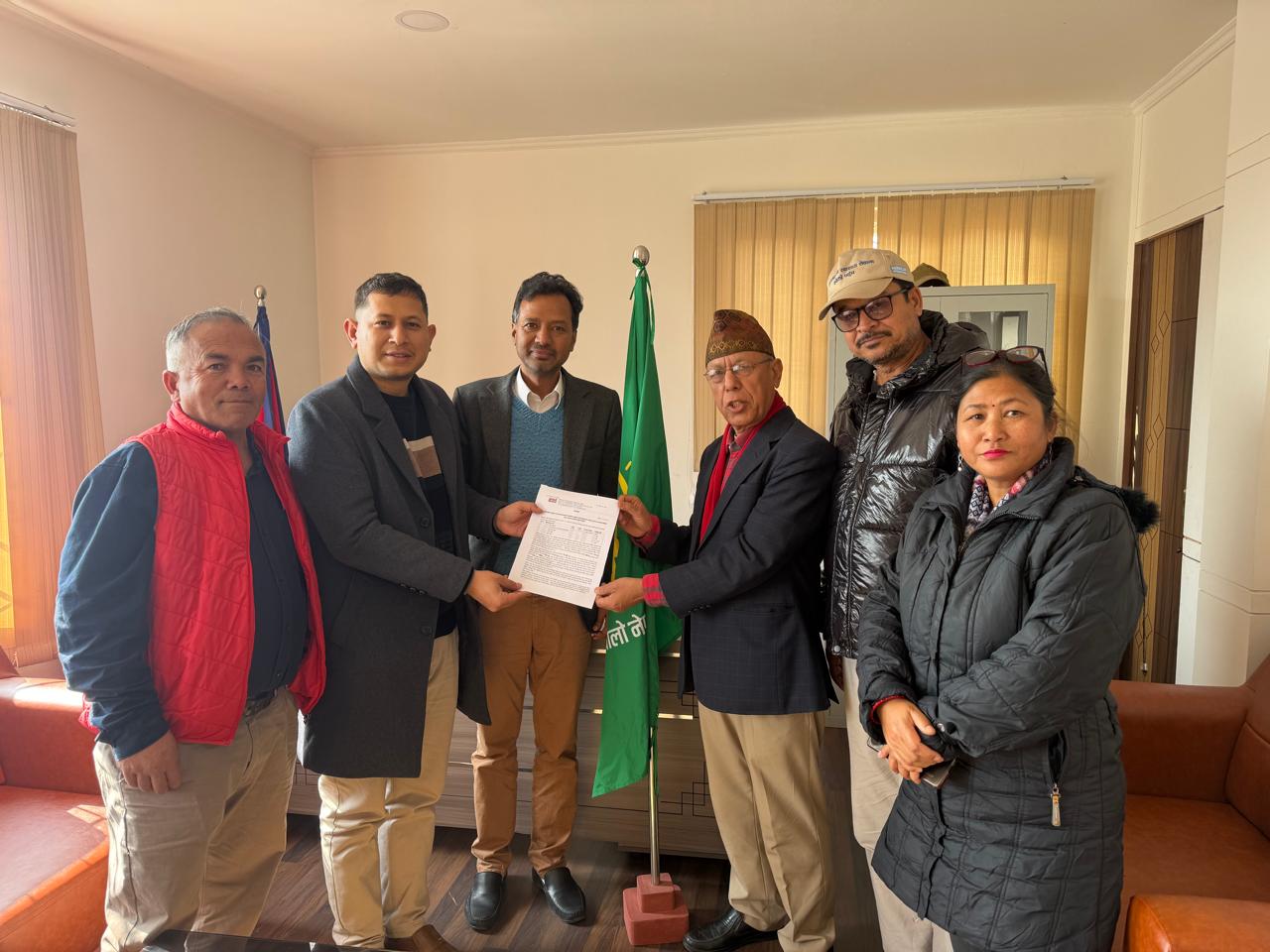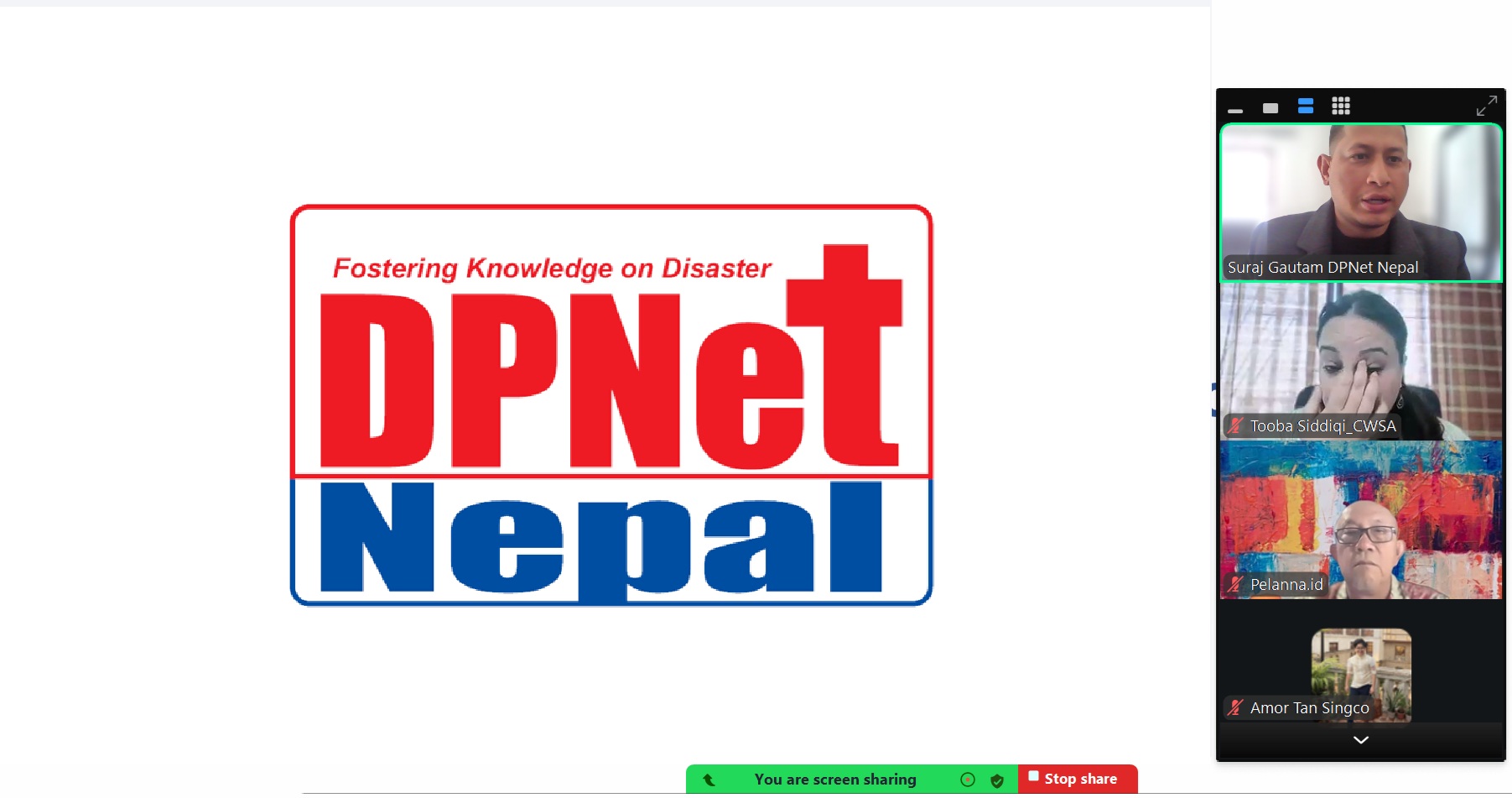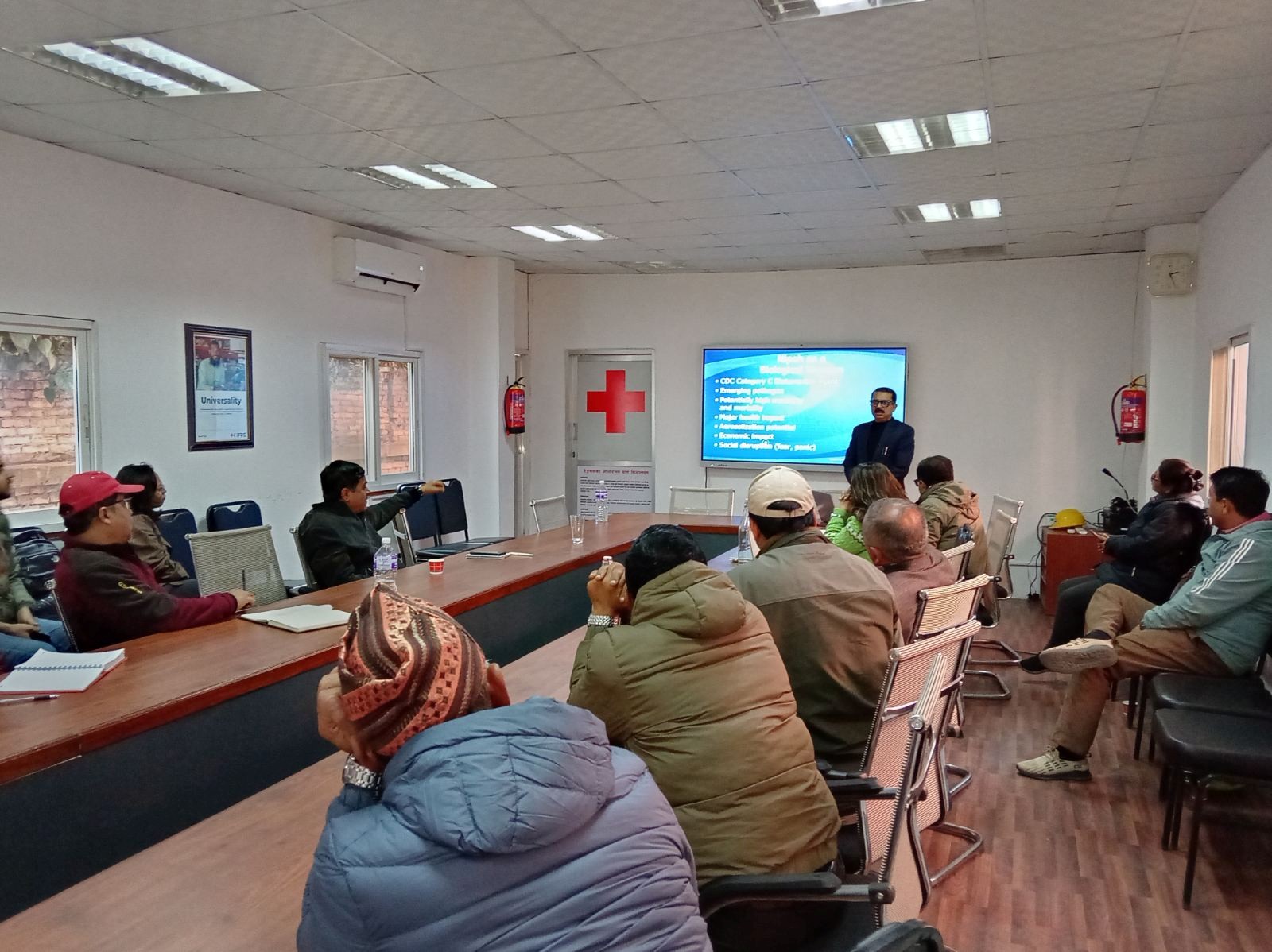Interaction Program on Online Resource Center and Virtual DRR Platform

On December 5, 2023, DPNet Nepal, in collaboration with USAID Tayar Nepal, organized an interaction program focusing on the Online Resource Center (ORC) and Virtual Disaster Risk Reduction Platform (VDRR). Mr. Surya Bahadur Thapa, DPNet Chair, presided over the event. Among the distinguished guests were Mr. Kedar Neupane, Former Secretary at the Government of Nepal, Mr. Khem Raj Paudel, Section Officer from NDRRMA, and Ms. Krishna Karkee, Disaster Preparedness and Response Specialist from USAID Tayar Nepal. Additionally, past chairs, advisors of DPNet, and representatives of agencies actively involved in DRR were present.
Mr. Kshitiz Paudel, Program Coordinator at DPNet Nepal, commenced the event with a warm welcome to distinguished guests and participants, providing a brief highlight of the program.
Mr. Surya Bahadur Thapa offered insightful remarks during the program overview, underscoring the importance of the ORC and VDRR in promoting awareness and knowledge exchange about DRR among the audience. He traced the evolution of the ORC from its initial state to its current state, with various modifications emphasizing its effectiveness in disseminating the information. Mr. Thapa advocated for the establishment of an internal monitoring mechanism within DPNet to enhance the documentation and overall effectiveness of the ORC. He further explained that the program aimed to provide recent updates to the ORC, with a focus on planning a way forward. The objective of the program is to offer suggestions and recommendations for further improving these two essential platforms for DRR, with an emphasis on strengthening the repository with relevant and robust resources that will enhance the ORC's ability to fulfill its purpose in the field of DRR.
Dr. Raju Thapa, Vice-Chair of DPNet, explained the origins and purpose of the ORC, emphasizing its role as a centralized repository for scattered documents on DRR. He highlighted the user-friendly design of the ORC, aimed at providing easy access for stakeholders and interested individuals through search engines and DPNet website search features. Dr. Thapa underscored the ORC's proactive approach in preventing document duplication and ensuring transparency in DRRM efforts. Additionally, he emphasized the ORC's significance as a platform for documenting expert research in DRR, catering to academic needs. He highlighted that documents are meticulously classified under relevant categories and sub-categories, accompanied by well-articulated summaries and publisher information, offering a comprehensive overview for users.
Dr. Thapa also highlighted the effectiveness of the VDRR platform, initiated to discuss contextual DRR issues. He noted that relevant and useful reflections from these discussions are documented and recommended to the concerned authorities to enhance DRRM practice. Dr. Thapa specifically pointed out a recent discourse on Lessons from the Jajarkot Earthquake Response and Strategies for Effective Post-Earthquake Reconstruction, noting substantial engagement and the surfacing of critical issues that had not been previously addressed. According to Dr. Thapa, one major concern highlighted during the current virtual discussion was the revelation that numerous homes were constructed on land with ownership certificates issued by the former Maoist Parallel Government whereas the Supreme Court invalidated these certificates, creating a dilemma for residents holding "Janabadi" land certificates who experienced earthquake damage. Dr. Thapa stressed the need for government attention and resolution before proceeding with reconstruction efforts and other initiatives.
Furthermore, Dr. Thapa highlighted the newly initiated complaint hearing mechanism by DPNet, aimed at establishing a trend of listening to complaints and obtaining feedback regarding activities in humanitarian sectors to increase the accountability of humanitarian actors and agencies. He clarified that suggestions and feedback received through the complaint box are kept anonymous and forwarded to the concerned bodies as a reference for improvement in lagging areas.
Mr. Bijay Rai, Technical Consultant at DPNet, shared a comprehensive presentation on the ORC and VDRR of DPNet Nepal. He introduced the ORC as a web-based centralized hub dedicated to collecting and organizing diverse information on disaster management. He explained that the ORC aims to provide easy and spontaneous access to a wide array of resources, fostering efficient information gathering with the objectives of facilitating knowledge sharing, ensuring timely dissemination of critical information during disasters, and supporting research initiatives.
Mr. Rai highlighted the user-friendly features of the ORC, such as document titles in both English and Nepali, web accessibility functions for persons with visual impairment, and easy navigation panels. Each document includes articulated summaries, facilitating quick identification of relevant content. He shared that currently, the platform hosts over 1400 documents under segregated categories.
Mr. Rai further discussed the VDRR platform, emphasizing its role as a discussion forum dedicated to DRRM. He shared that the platform facilitates collaboration among stakeholders through categorized discussions. Mr. Rai shared the platform's transformation, enabling anonymous comments for user comfort and openness. He highlighted that discussions cover various topics related to disaster and climate change, harnessing the collaborative power of stakeholders. Mr. Rai also touched upon the DPNet complaint box, designed to gather suggestions and feedback about humanitarian actor agencies' performance and accountability. Looking ahead, Mr. Rai outlined potential advancements for the ORC, including better web accessibility, search engine optimization, regular updates, and user-focused evaluation. For the VDRR platform, he proposed community building through targeted discussions, internationalization efforts, and user training programs. He further shared that a mobile application could enhance accessibility and foster a sustainable community, ensuring valuable insights continue to shape effective disaster risk reduction strategies.
Mr. Surya Bahadur Thapa provided a short reflection of the presentation and announced the opening of the floor for discussion and welcomed ideas, and feedback for making the ORC and VDRR more impactful and effective.
Open Floor Discussion:
Mr. Man Bahadur Thapa, Advisor at DPNet Nepal, raised a query regarding the availability of disaster databases and stressed the importance of collecting relevant databases in the DPNet ORC from reliable sources. Acknowledging that Nepal lacks robust database systems to support such platforms, there are concerns about the sustainability and reliability of the resources. Additionally, he commended the DPNet team for setting up a complaint box and suggested improving the mechanism to effectively respond to the suggestions, recommendations, and complaints received.
Mr. Pitambar Aryal, Former Chair and Advisor at DPNet Nepal raised inquiries regarding the process of collecting documents and information. He expressed concerns about the authenticity, legal issues, and reliability of the research paper on ORC. Mr. Aryal suggested a collaboration with academic institutions and universities to include significant PhD theses, Master's theses, and research papers in the ORC, considering the challenges the general public faces in obtaining such resources. Additionally, he recommended hosting regular discussions on specific themes to expand user outreach and increase the impact of raising awareness on DRR. Mr. Aryal emphasized the need for a responsive mechanism for problem-solving instead of merely accumulating complaints and suggestions. He proposed mobilizing technical human resources, including engineers and geotechnical experts, to address technical queries within the response mechanism. Concerning the VDRR, Mr. Aryal discussed the necessity for a moderator overview of comments during discussions to ensure a more focus-oriented dialogue. Expressing sustainability concerns, he questioned the long-term maintenance impact of the platforms established by DPNet.
Mr. Shyam Sundar Jnavaly, Advisor at DPNet Nepal, congratulated DPNet for its significant progress in the DRRM arena, reflecting on his experience of establishing the DPNet website in 2004 A.D. and its subsequent development in 2009 A.D. He emphasized the importance of finding ways to enhance community access to documents and resources. Mr. Jnavaly suggested linking social media platforms to disseminate information about DPNet's resource center and VDRR. He explained that this approach would not only engage those familiar with DPNet and DRR actors but also enable the general public to actively participate in and contribute to improved DRRM practices. He also proposed establishing a linking mechanism for resources uploaded elsewhere to minimize document and data duplication. Furthermore, Mr. Jnavaly inquired about the existence of a mechanism allowing users to upload documents after certain verifications, thereby expanding the platform's public reach and increasing the availability of valuable resources. He sought information on the audio-visual depository mechanism, particularly how DPNet's YouTube channel is linked with the ORC platform. Regarding the DPNet complaint box, he underscored the importance of maintaining the confidentiality and privacy of sensitive information shared by users, emphasizing the need to address this aspect from a legal viewpoint.
Mr. Ram Chandra Neupane, Former Chair and Advisor at DPNet Nepal commended DPNet for the launch of the ORC as a repository for DRR-related documents. He underscored the importance of broadening community engagement in DRR discussions on the VDRR platform by integrating it with popular social media channels. Additionally, he advocated for addressing pertinent topics such as the one-door policy in DRR. Mr. Neupane emphasized the need for a user-driven document upload mechanism, along with a monitored filtering and verification system to prevent duplication and misinformation. Regarding the complaint box, he suggested implementing a lesson learned and action model to enhance the effectiveness of DRRM practices.
Ms. Krishna Karkee, Disaster Preparedness and Response Specialist from USAID Tayar Nepal commended DPNet for initiating the preparation and dissemination of situation reports for disasters. She advised integrating disaggregated data for those affected, considering factors such as gender, minorities, and other marginalized groups, as a reference for intervention efforts through the ORC. Ms. Karkee stressed the importance of adopting a 'do no harm' policy and encouraged the upload of refined, grammatically correct documents to prevent the haphazard collection of information.
Additionally, Ms. Karkee emphasized the necessity of designing a complaint mechanism that allows for anonymous postings of complaints, suggestions, and recommendations to safeguard user privacy. While acknowledging that governmental and non-governmental organizations already have their complaint mechanisms, she suggested focusing efforts on advocacy to ensure accountability within these existing entities which will in turn strengthen the mechanisms already in place, promoting efficiency and collaboration in addressing concerns and improving DRRM practices.
Ms. Santona Devkota KC, Vice President of the National Campaign for Education Nepal, raised concerns regarding the popularity and public reach of the platforms, emphasizing the crucial need to assess their sustainability and user-friendliness. She highlighted the importance of consistently organizing discussions on disaster and climate-related topics on the VDRR platform to guarantee a lasting impact.
Ms. Sarita Karki from NDRC emphasized the importance of categorizing discussion topics appropriately to facilitate structured discussions related to the VDRR platform. She also highlighted the significance of conveying the outcomes of these discussions as feedback to the relevant stakeholders for further improvement.
Prof. Dr. Hari Darshan Shrestha, Advisor at DPNet, raised concerns about the response mechanism and expertise reflection for future actions, drawing on suggestions and recommendations derived from discussions on the VDRR platform. He highlighted the critical need to assess website capacity and emphasized the importance of disseminating resources on a source-linking basis. Prof. Shrestha also stressed the importance of accountability within the ORC. Additionally, he underscored the necessity of reflecting on the relevance of the complaint mechanism and considering ethical limitations. Furthermore, Prof. Shrestha emphasized the idea of opening the VDRR platform to other stakeholders, allowing them to facilitate their discussions and contribute to the platform.
Mr. Dambar Bista from NRCS emphasized the need for maintaining quality assurance and making efforts to increase accessibility throughout all the platforms to ensure the inclusion and voice of marginalized groups are heard.
Mr. Dayasagar Shrestha from DiMaNN raised inquiries regarding the sustainability plans for the ORC. He underscored the importance of establishing a separate guiding team dedicated to the ORC to ensure its effective management and development. Mr. Shrestha further proposed implementing a voluntary self-uploading mechanism in the ORC to enhance efficiency and encourage resource contributions. Additionally, he emphasized the need to increase the frequency of discussions on the VDRR platform. These suggestions are aimed at strengthening the overall impact and functionality of both platforms within the context of DRRM.
Mr. Khem Raj Paudel from NDRRMA emphasized identifying the target audience for the ORC and VDRR. He highlighted the necessity of disseminating information to individuals unaware of DRR efforts, emphasizing its significance to effectively raise awareness and improve digital literacy. Additionally, Mr. Paudel stressed the importance of ensuring that platforms like the ORC remain active even after the conclusion of specific projects. Regarding the complaint box, he recommended restricting it to issues solvable by DPNet to maintain ethical standards and prevent potential conflicts. According to him, these considerations are aimed at enhancing the impact and sustainability of platforms while adhering to ethical guidelines.
Dr. Raju Thapa provided insights into the question raised during the discussion concerning the ORC, emphasizing its web-based design for sustainability and a user-friendly interface. He underscored the importance of the complaint box in ensuring accountability for humanitarian field workers, particularly those in public-facing roles while maintaining the privacy of users utilizing this feature.
Furthermore, Dr. Thapa outlined the purpose of discussions on the VDRR platform, which involves collecting recommendations, documenting them, and forwarding them to relevant authorities, similar to the process during the CHS global revision. In terms of outreach, DPNet has a database of 19,500 DRR localization graduates at the local level, continuing to provide vital information to these trained personnel. Dr. Thapa expressed confidence in the ORC's ability to sustain itself even without specific projects through effective internal management within DPNet. Regarding the linking of resources collected from various areas, he shared that solely including links may pose a problem if the links related to other websites become unavailable or disrupted.
Mr. Bijay Rai addressed the concerns and queries raised by participants during the discussion. He clarified that voluntary uploading of documents is not implemented to prevent potential verification issues, as it might require additional human resources for shortlisting and verifying documents. Regarding the linking mechanism, Mr. Rai suggested the formation and utilization of server drivers. Furthermore, he explained that audio-visual resources are uploaded on the YouTube channel of DPNet and linked on the ORC to conserve ORC web space for richer document resources.
Mr. Kedar Neupane, Former Secretary of Government of Nepal and Advisor of DPNet highlighted the significance of the ORC and the VDRR platform, acknowledging them as remarkable initiatives by DPNet with a substantial impact on DRR efforts. He stressed the importance of efforts directed toward ensuring the authenticity of uploaded documents and resources, underlining the need to reflect the broad scope of DPNet. Additionally, Mr. Neupane emphasized the significance of consensus-building, emphasizing collaborative efforts to strengthen the effectiveness and reach of these platforms within the context of DRR initiatives.
Mr. Surya Bahadur Thapa, Program Chair, concluded the session by providing insights into the transformative history of the DPNet ORC and VDRR platforms over time. Looking ahead, he, on behalf of the DPNet team, committed to reviewing the existing complaint box mechanism, linking social media with the VDRR platform, and exploring avenues to connect academic documents related to DRR through collaboration with universities.











